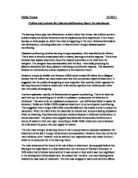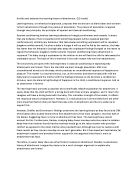Outline and evaluate the learning theory of attachment
Outline and evaluate the learning theory of attachment (12 marks)
The learning theory, or behaviourist approach, is based on the idea that we are born as blank slates -“tabula rasa”- and that we learn all our behaviour through the process of association. The theory suggests that the process of association is applied through classical and operant conditioning, and they create attachments between infant and caregiver.
Firstly, operant conditioning is the idea that behaviours that produce a reward (positive reinforcement) or behaviours that will stop something unpleasant (negative reinforcement) will be repeated. For example, in 1950 Dollard and Miller came up with a process of operant conditioning that supports the idea that food is why we form attachments. Their theory supports the learning theory. This was that when an infant is hungry they will enter a negative drive state and cry (which is a social releaser). Being fed removes the hunger and so encourages the infant to repeat the behaviour (negative reinforcement). However, the baby is also fed by the mother/caregiver, which acts as a reward for their crying (positive reinforcement). In this case food is the primary reinforcer and the mother is the secondary reinforcer, and because she is the source of the food, an attachment bond is made.








